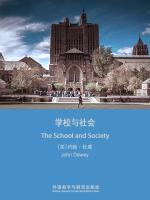School and Society
Spider-Man
"School and Society," written by John Dewey, is a profound
exposition that delves into the relationship between educational
institutions and the broader social context. Published in 1899, this
classic work remains highly relevant today due to its visionary ideas
and perspectives on education. Dewey's book challenges traditional
notions of education by promoting a more dynamic and inclusive approach.
The author argues that schools should not be isolated environments but
serve as microcosms of society, preparing students to actively
contribute to the well-being and progress of their community. He
emphasizes the importance of integrating real-life experiences into the
curriculum, facilitating hands-on learning, and nurturing critical
thinking skills. One highlight of this book is Dewey's concept of
"progressive education." He advocates for an education system
that focuses on the holistic development of students, fostering
creativity, adaptability, and moral character. Instead of lecturing and
rote memorization, Dewey suggests that educators adopt interactive
teaching methods, encouraging students to explore and experiment. He
punctuates his argument with examples showcasing how students thrive
when they are personally invested in their learning. Throughout the
book, Dewey also addresses the socioeconomic disparities prevalent in
society and their influence on educational outcomes. He highlights the
need for equal educational opportunities for all children and
underscores the transformational power that education has to shape
society. By spotlighting the relationship between schooling and societal
norms, Dewey prompts readers to contemplate the profound impact
education can have on the fabric of the entire community. One cannot
overlook the remarkable foresight exhibited by Dewey in "School and
Society." Many of his ideas, such as experiential learning and
student-centered classrooms, were ahead of their time. Today, these
concepts have gained recognition and have become central pillars in
educational reform efforts worldwide. Dewey's writing style is
accessible, avoiding overly technical language and making it suitable
for a wide range of readers. However, some readers may find the book's
tone and ideas challenging, as it challenges long-established
educational norms. Nevertheless, the effort put into understanding and
reflecting on Dewey's arguments is worthwhile, as it encourages readers
to critically evaluate conventional educational practices. In
conclusion, "School and Society" is a seminal work that
continues to inspire educators, policymakers, and scholars alike.
Dewey's visionary ideas on progressive education and the synergy between
schools and society have left an indelible mark on the field of
education. This thought-provoking book compels readers to reconsider
traditional educational approaches, ultimately paving the way for a more
inclusive and student-centered education system.




 京公网安备 11010802032529号
京公网安备 11010802032529号